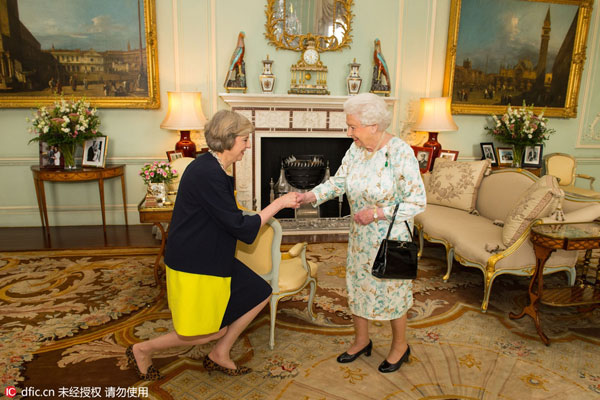 |
|
Queen Elizabeth II welcomes Theresa May, left, at the start of an audience in Buckingham Palace, London, where she invited the former Home Secretary to become Prime Minister and form a new government, July 13, 2016.[Photo/IC] |
Theresa May, the 59-year-old daughter of a Church of England vicar, took over as UK prime minister at one of the most turbulent times in modern British politics.
May, who was the longest-ever holder of the post of Home Secretary, or interior minister, became the only candidate to replace David Cameron after her last rival dropped out on Monday.
In a ceremony that has been repeated 13 times since Queen Elizabeth ascended to the throne in 1952, Cameron drove to Buckingham Palace for a last audience where he formally tendered his resignation and then recommended to the monarch that May be appointed in his place.
Her appointment means an end to six years of the country's top post being held by an Old Etonian, Britain's leading private school. May, from the southern city of Oxford, attended a state secondary school before gaining a place at Oxford University. She is Britain's second female prime minister; the first was Margaret Thatcher, who served from 1979 to 1990.
Top of May's list will be how to handle what has become known as Brexit, the process of Britain leaving the European Union after 51.89 percent of the country's voting population elected to leave the EU in a controversial referendum last month.
Although May herself voted to remain in the EU, she told reporters after winning the prime ministerial race: "Brexit means Brexit."
Although the EU negotiations are top of her list of things to do, the economy is not far behind – although stock markets have rallied since plunging on the morning of the referendum result, the pound has yet to regain the losses it made against the US dollar, as it fell to its lowest point in 31 years.
Philip Hammond, the Foreign Secretary, as least as of Wednesday, told reporters: "Until we have served an Article 50 notice, we remain a full, participating member of the EU and our ability to negotiate new trade agreements is restricted by continuing application of EU law until we have negotiated our exit."
He said because of the various procedures involved, Britain's departure from the EU could take as long as five years.
May will also need to maintain cordial relations with Beijing until the uncertainty over Brexit is cleared up. China has made it clear that it will be business as usual, and has indicated it is open to negotiating a new trade deal as soon as is possible.
But it is the uncertainty that May will need to address.
It has become clear in recent days that because Britain's membership of the EU is governed by an act of parliament which accepted the terms of the 2009 Lisbon Treaty which governs the establishment of the EU, only another act of parliament can undo it.
At the last count, 479 members were in favour of remaining in the EU, with 158 committed to leaving. In addition, parliament has said it will debate a petition signed by over 4 million people calling for the results of the June 23 referendum to be examined.
In addition, over 1,000 lawyers have written a joint letter to parliament and the government stressing that under the UK constitution, a referendum is advisory, and not legally binding.
Two separate law suits have been launched in England's High Court challenging the referendum result on the grounds that the Vote Leave campaign based its argument on false or misleading information.
Supporters of Brexit maintain that whatever the constitutional arguments, it would be foolish for a government to go against the wishes of the people as expressed in the referendum.
Much now depends on who May appoints to head up the Brexit negotiating team to deal with Brussels.
To contact the reporter: [email protected]